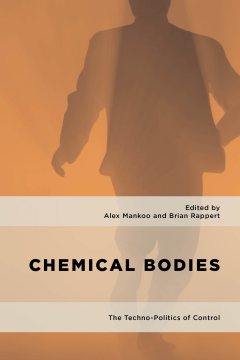
Additional Information
Book Details
Abstract
In warfare, civil unrest, and political protest, chemicals have served as means of coercion, suppression, and manipulation. This book examines how chemical agents have been justified, utilised and resisted as means of control. Through attending to how, when, and for whom bodies become rendered as sites of intervention, Chemical Bodies demonstrates the inter-relations between geopolitical transformations and the technological, spatial and social components of local events.
The chapters draw out some of the insidious ways in which chemical technologies are damaging, and re-open discussion regarding their justification, role and regulation. In doing so the contributors illustrate how certain instances of force gain prominence (or fade into obscurity), how some individuals speak and others get spoken for, how definitions of what counts as ‘success’ and ‘failure’ are advanced, and how the rights and wrongs of violence are contested.
Chemical Bodies gathers notable experts, using case studies across time and space, to examine how chemical agents have been framed as weapons (or not), by whom, for whom, and the political/policy stakes involved. The book is a critical read for academics, intelligence officials, and policymakers who wrestle with how to make sense of chemical and biological threats past and present.
Kathleen Vogel, Associate Professor, School of Public Policy, the University of Maryland
Alex Mankoo is a PhD candidate in the Science and Technology Studies Department at University College London and a Visiting Fellow in the Science, Technology and Society Program at the Harvard Kennedy School of Government (Spring 2018). His research interests include the history of chemical and biological weapons, intersections between science and security, and the sociology of security technologies more generally. His PhD research, funded by the Economic and Social Research Council (ESRC), focuses on the technological trajectory of teargas in mid-20th century Britain and the types of legitimacy it gained during this period.
Brian Rappert is a Professor of Science, Technology and Public Affairs at the University of Exeter. His long-term interest has been the examination of the strategic management of information; particularly in the relation to armed conflict. His books include Controlling the Weapons of War: Politics, Persuasion, and the Prohibition of Inhumanity; Biotechnology, Security and the Search for Limits; and Education and Ethics in the Life Science. More recently he has been interested in the social, ethical, and political issues associated with researching and writing about secrets, as in his books Experimental Secrets (2009), How to Look Good in a War (2012) and Dis-eases of Secrecy (2017). For more information see http://brianrappert.net/
At a time of intense political scrutiny of chlorine and acid attacks, this book takes a deeper dive into historical framings of the chemical weapons taboo. The contextually rich body of work carefully teases out how chemical agents have been justified and resisted as instruments of control, coercion and warfare across time and space. Its portrayal of the dynamics and shifting notions of normative values makes the book indispensable reading to anyone who holds dear the ban on chemical weapons.
Filippa Lentzos, Senior Research Fellow, Department of War Studies and Department of Global Health and Social Medicine, King's College London
Table of Contents
| Section Title | Page | Action | Price |
|---|---|---|---|
| Chemical Bodies | Cover | ||
| Contents | v | ||
| Acknowledgements | vii | ||
| Abbreviations | ix | ||
| 1 Transgressive Chemicals | 1 | ||
| 2 From Reviled Poisons to State Arsenals: The Un(necessary) Proliferation of Chemical Weapons | 23 | ||
| 3 Lesser Appreciations: A History of Interwar Chemical Warfare | 41 | ||
| 4 Biological Warfare, Chemical Warfare and the Public Body | 59 | ||
| 5 Opening Spaces through Exhibiting Absences: Representing Secretive Pasts | 77 | ||
| 6 Tear Gas Epistemology: The Himsworth Committee and Weapons as Drugs | 103 | ||
| 7 What Counts as a Chemical Weapon? The Category of Law Enforcement in the Chemical Weapons Convention | 125 | ||
| 8 Tear Gas and Colonial Bodies in the British Interwar Period | 151 | ||
| 9 Controlling and Caring for Public Bodies: Civil Defence Gas Tests in World War II Britain | 165 | ||
| 10 ‘Chemical Bodies’ and the Future of Control | 185 | ||
| About the Contributors | 205 | ||
| Index | 209 |
